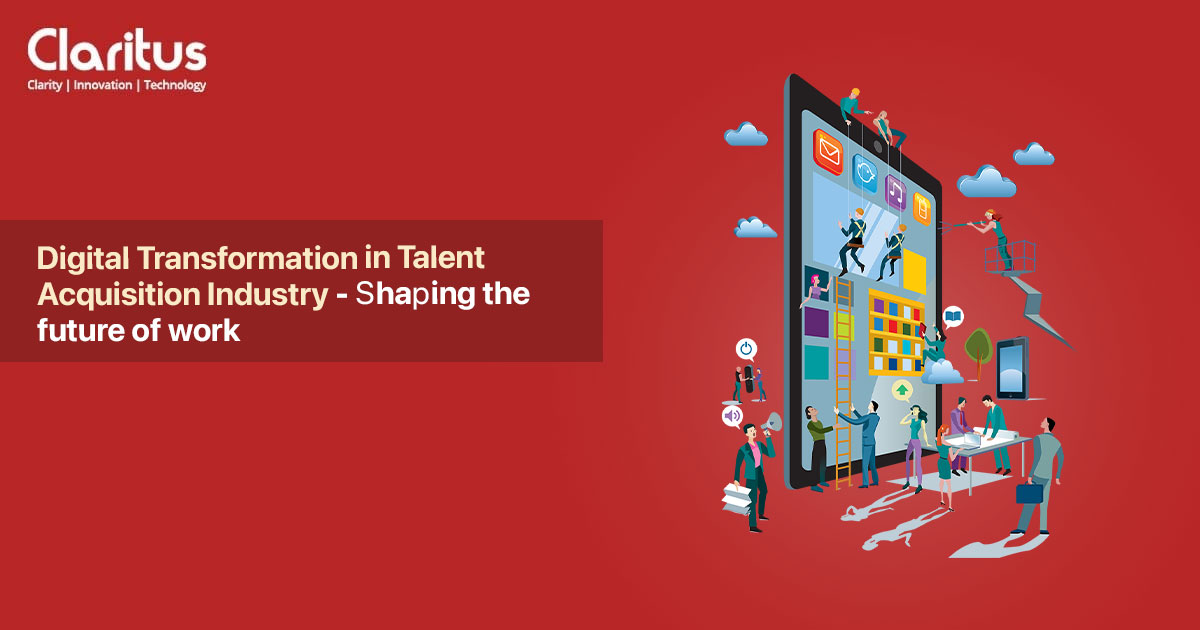Digital Transformation in Talent Acquisition Industry

Shaping the future of work
In today’s fast-paced and evolving job market, the advent of digital transformation has become a pivotal force reshaping the landscape of talent acquisition. As businesses navigate through the complexities of a dynamic workforce and rapid technological advancements, the integration of digitalization into talent acquisition processes has emerged as a transformative strategy, fostering efficiency, innovation, and adaptability.
The Changing Face of Talent Acquisition
The traditional methods of talent acquisition are becoming obsolete in the face of technological innovations. The digital transformation in talent acquisition is not merely a technological upgrade; it is a strategic shift in how organizations attract, assess, and retain top talent. This transformation encompasses a holistic approach, leveraging cutting-edge technologies to streamline recruitment processes, foster a data-driven culture, and create an agile, responsive workforce.
Optimizing Recruitment Processes
One of the primary impacts of digital transformation in talent acquisition is the optimization of recruitment processes. Artificial Intelligence (AI) and machine learning algorithms are now integral to identifying and selecting the best-fit candidates. Automated resume screening tools efficiently sift through vast pools of applicants, saving time and ensuring that human resources are directed towards more strategic, value-added tasks.
Digital transformation has also given rise to the use of Applicant Tracking Systems (ATS), enabling recruiters to manage the entire recruitment process seamlessly. These systems facilitate collaboration among hiring teams, enhance communication, and provide valuable insights into recruitment metrics. Real-time analytics empower recruiters to make data-driven decisions, improving the overall efficiency and effectiveness of the hiring process.
Enhancing Candidate Experience
In the digital era, the candidate experience is a critical factor in attracting and retaining top talent. Digital transformation initiatives in talent acquisition focus on creating a positive and engaging experience for candidates throughout the recruitment journey. Chatbots and virtual assistants offer instant support, answer queries, and provide timely updates, ensuring that candidates feel valued and informed.
Moreover, the use of video interviewing platforms has become commonplace, allowing candidates to showcase their skills in a more dynamic and personalized manner. This not only expedites the hiring process but also provides a richer understanding of a candidate’s capabilities beyond what a traditional resume can convey.
Navigating the Gig Economy
As the gig economy continues to gain prominence, digital transformation in talent acquisition becomes pivotal in adapting to this shifting employment landscape. Organizations are leveraging digital platforms to connect with freelancers, contract workers, and remote talent. The use of online talent marketplaces and freelance management systems has become integral in sourcing, managing, and retaining gig workers.
Digitalization facilitates the creation of talent pools, allowing organizations to tap into specialized skills on-demand. This agility in talent acquisition aligns with the dynamic needs of the gig economy, ensuring that organizations can quickly assemble teams with the right skills for specific projects.
Building a Data-Driven Culture
In the digital transformation journey of talent acquisition, data emerges as a powerful asset. The collection and analysis of data provide insights into recruitment trends, candidate behaviors, and the overall effectiveness of hiring strategies. This data-driven approach enables organizations to refine their talent acquisition strategies continually.
Predictive analytics play a crucial role in forecasting future talent needs, identifying potential skill gaps, and optimizing recruitment budgets. Harnessing the power of data allows organizations to make informed decisions, align their talent acquisition strategies with business objectives, and stay ahead in the competitive talent landscape.
Embracing Remote Work Dynamics
The global shift towards remote work has accelerated the need for digital transformation in talent acquisition. Organizations are adopting virtual recruitment processes, utilizing online collaboration tools, and leveraging digital platforms to onboard and integrate remote employees seamlessly.
Video conferencing, collaborative project management tools, and virtual reality simulations for on-the-job training have become integral components of the digitalized talent acquisition landscape. These tools not only enhance the efficiency of remote hiring processes but also contribute to creating a cohesive and connected remote workforce.
Overcoming Challenges with Technology
While the benefits of digital transformation in talent acquisition are evident, organizations must also navigate challenges that accompany technological advancements. Privacy concerns, bias in algorithms, and the need for upskilling the existing workforce to adapt to new technologies are crucial considerations.
Addressing these challenges requires a strategic and ethical approach to digital transformation. Organizations must prioritize diversity and inclusion, invest in cybersecurity measures, and provide continuous training to ensure that their teams are well-equipped to leverage and manage emerging technologies responsibly.
The Future Landscape
Digital transformation in talent acquisition is an ongoing journey rather than a destination. As technology continues to evolve, organizations must remain agile and adaptive to stay at the forefront of talent acquisition trends. The integration of Artificial Intelligence, data analytics, and innovative technologies will play a pivotal role in shaping the future of work.
Predictive workforce analytics, personalized candidate experiences, and the seamless integration of human and machine capabilities will define the next phase of digital transformation in talent acquisition. As organizations continue to embrace these advancements, they will not only attract top talent but also position themselves as leaders in a rapidly changing business environment.
In conclusion, the digital transformation in talent acquisition is not just a technological evolution; it is a strategic imperative for organizations looking to thrive in the future of work. By embracing digitalization, optimizing recruitment processes, enhancing candidate experiences, and building a data-driven culture, organizations can stay agile, resilient, and competitive in the dynamic landscape of talent acquisition. The future belongs to those who leverage the power of digital transformation to shape a workforce that is not just prepared for change but thrives in it.
